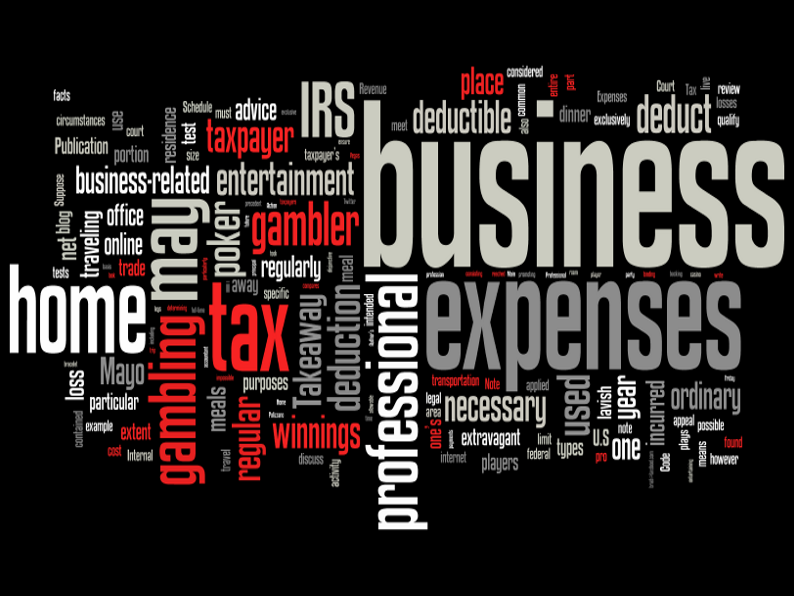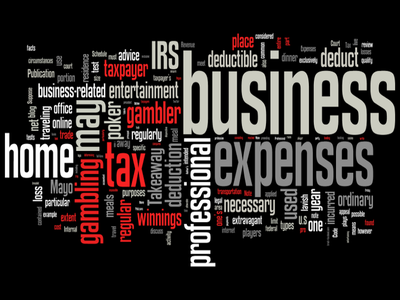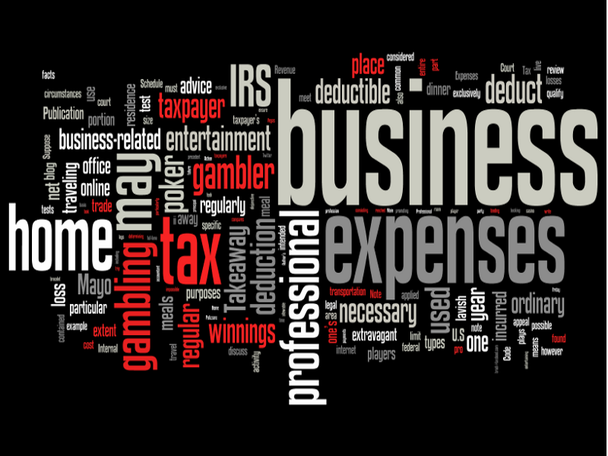


Today we review the extent a professional gambler may deduct business expenses and the rules governing some common types of business deductions.
As discussed last week, a professional gambler may deduct “ordinary and necessary” business expenses incurred in connection with the trade or business of gambling under section 162(a) of the Internal Revenue Code. What if the business expenses exceed a professional gambler’s “net” gambling winnings?
Takeaway #1: A professional gambler may deduct ordinary and necessary business expenses beyond the extent of his “net” gambling winnings from the year, and thus may report a business loss from gambling.
Suppose a pro gambler is a net loser for the year. Because gambling losses may be deducted only to the extent of gambling winnings, he must claim a “net” of zero gambling winnings for the year on his Schedule C. The pro gambler is not limited, however, from further deducting “ordinary and necessary” business expenses. This would produce a business loss that may be applied against other income from the year.
The legal precedent for this proposition is from the recent U.S. Tax Court case Mayo v. Commissioner, 136 T.C. 4 (2011). For his 2001 tax year, Ronald Mayo, a professional gambler, had $120,463 in gambling winnings, $131,760 in gambling losses, and $10,968 in business expenses. The IRS had disallowed his reported Schedule C loss of $22,265. Although Mr. Mayo could not deduct the $11,297 portion of the loss attributable to his wagering activity, the court said, he could deduct the $10,968 portion consisting of business expenses.
The U.S. Tax Court is a federal court of record. The Mayo decision is binding on both the IRS and taxpayers, unless reversed on appeal. The IRS has said it will not appeal Mayo in this Action on Decision.
So, what are considered “ordinary and necessary” business expenses for the professional gambler? Generally, “ordinary” expenses are common and accepted in the trade or business, and “necessary” expenses are helpful and appropriate in the business. With that in mind, let’s review travel and entertainment expenses.
Takeaway #2: A taxpayer may deduct travel expenses incurred for one’s profession only if traveling away from one’s “tax home.”
The “tax home” is the taxpayer’s regular place of business. If the taxpayer does not have a regular place of business, then the tax home is where the taxpayer regularly lives. Note that if the taxpayer does not live at his tax home, there is no allowable deduction for the cost of traveling between the tax home and family home.
The regular place of business for many professional poker players is their residence, regardless of whether they predominantly play live or online. I suppose the IRS could assert that a particular brick and mortar casino is a professional poker player’s regular place of business. That argument may have legs if the taxpayer regularly plays at one particular poker room.
Some types of deductible expenses incurred by traveling away from one’s tax home:
- Travel by airplane, train, or bus between the tax home and business destination;
- Fares for transportation between the airport and hotel; and
- Lodging and meals if the business trip is overnight.
Expenses for meals that are lavish or extravagant, however, are not deductible. The lavish or extravagant standard is one of reasonableness, depending on the facts or circumstances. A $500 dinner at an upscale Las Vegas restaurant, for example, would almost certainly be considered lavish or extravagant by the IRS.
Takeaway #3: Ordinary and necessary business-related entertainment expenses (including entertainment-related meals) are deductible only if they meet either the (i) directly-related test or (ii) associated test.
For brevity purposes, I won’t list the tests here. They can be found in IRS Publication 463. The publication also suggests types of records the IRS is looking for.
In what context may the business-related entertainment deduction arise for poker players? Suppose a professional was backed for the World Series of Poker Main Event, and took home the coveted bracelet. The champ then decides to take his backer out for dinner to discuss possible future backing. Assuming the cost of the dinner is not exorbitant, it is deductible. Speaking of business-related meal expenses, they are not entirely deductible.
Takeaway #4: Only 50% of the business-related meal and entertainment expenses are deductible.
This limitation applies to business meals or entertainment expenses incurred while traveling away from the “tax home” on business or entertaining business associates at any location. Note that the 50% limit does not apply to transportation to and from a business meal or business-related entertainment activity. The 50% limit is applied after determining the amount that otherwise would qualify as a deduction.
Let’s look at one more possible deduction that may be particularly relevant for online poker players: Home office expenses.
Takeaway #5: A professional gambler may deduct expenses for business use of the home if a part of the home is used exclusively and regularly as the taxpayer’s principal place of business.
There are several disjunctive tests found in IRS Publication 587 that a taxpayer may meet to qualify for the deduction. With respect to the test mentioned in Takeaway #5, note the terms “exclusively” and “regularly.” Exclusive means there is a specific area of the home used only for the trade or business. Regular means the specific area is used for business on a regular basis. There are limitations and caveats regarding the home office deduction, also covered in Publication 587.
An example of exclusive and regular use for an online poker player is one who plays full-time in a separate office within his residence, and does not use the office for other purposes.
To figure the deduction, one compares the size of the part of the home used for business to the size of the entire residence. The resulting percentage is used to compute the business portion of the expenses for operating the entire home. These expenses may include rent or mortgage payments, internet, utilities, etc.
Next time we transition the discussion to online gambling. How are those winnings taxed? Does Black Friday have any tax implications? Over the next couple of weeks, I tackle these questions and more.
Author’s note: I must remind all readers that it is impossible to offer comprehensive tax advice on the internet. Information I write on this blog is not legal advice, and is not intended to address anyone’s particular tax situation. Should you seek such advice, consult with a tax professional to discuss your facts and circumstances.
IRS Circular 230 Notice: To ensure compliance with requirements imposed by the IRS, I inform you that any U.S. federal tax advice contained in this blog is not intended or written to be used, and cannot be used, for the purposes of (i) avoiding penalties under the Internal Revenue Code or (ii) promoting, marketing or recommending to another party any transaction or matter that is contained in this blog.

